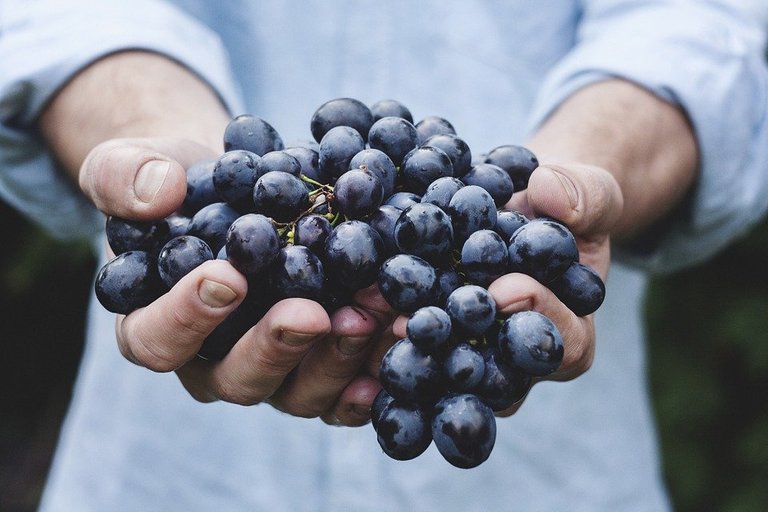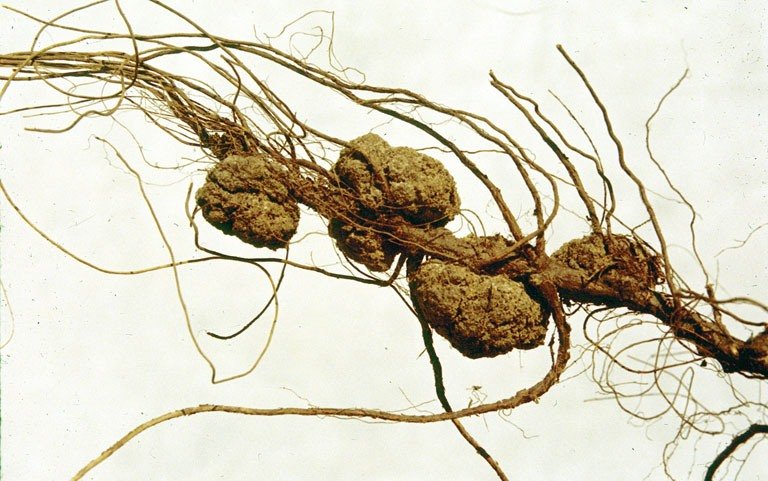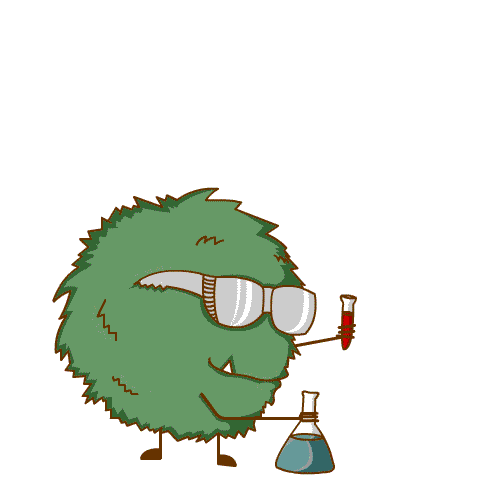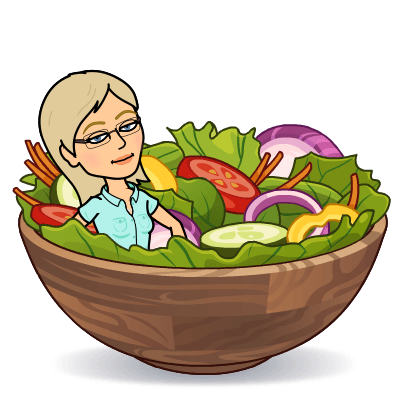
Oh no, GM-crops! The horror! The pain! The unhealthy side effects!
Over the years, GMOs (genetically modified organisms) have caused concern in many people. But what is a genetically modified organism? Is it really that dangerous? And if not, why are people so worried?
There are actually two definitions of transgenic:
- Organisms containing an artificially introduced change in their genome
- Stable introduction of a foreign gene into an organism
But what does that mean?
What happens if you shoot something with radiation? The DNA changes. In humans, that often leads to cancer and/or death. But plants are cool, plants can deal with that. They’re a lot better at healing and generally regenerating themselves than we are. @suesa

People have been using this fact since the 1930’s … and are still today! Plants are irradiated with γ-radiation or treated with mutagenic chemicals. And then they mutate. Scientists look at those plants and take those that have now developed properties they want, be it bigger fruits, better taste or whatever.
The changes in the DNA happen randomly and can’t be predicted.
The word foreign is actually a bit misleading. Yes, the DNA that’s introduced can come from a different organism but it can also come from the same or a similar organism! That would be called cisgenic instead of transgenic. It falls under the same set of rules.
There are several ways of introducing genes into a plant. Through microinjections, with chemicals, with a so-called “gene gun” or by using other organisms that do the work. Yesterday I already introduced you to Agrobacterium tumefaciens, which is used to induce mutations in Arabidopsis thaliana. This is a typical example of the insertion of foreign genes.
But wait, there are naturally occurring organisms that cause transgenic plants?
A. tumefaciens can be found basically everywhere in the soil. It can sense when a plant is wounded (because plants send out certain chemicals when that happens) and then move towards the wound. They enter the plant and then insert some of their own genes into the plant’s genome.
When activated, the new genes cause the plant’s cells to divide over and over again and produce growth hormones, causing a tumor. This is also called crown gall disease. The tumor provides perfect living conditions for the bacterium and the plant can usually still survive. As I said before, plants are incredibly resistant.

Parts of the bacteria genome can also be integrated into random parts of the plant’s genome which causes disruptions and mutations.
That’s useful for the lab, as we can just remove the “tumor” parts and keep the “causes random mutations” parts.
You might (or might not) ask yourself “Okay, there is a natural way to create transgenic plants, but what about cisgenic plants?”. Fear not! I can answer that too! With one of my favorite concepts: The jumping genes.
Jumping genes have first been discovered in Zea mays (corn). Did you know that this plant wasn’t originally yellow? Nowadays you can find it in many different color variations, often several colors on just one cob!

That’s the work of jumping genes, also called transposons.
There are two kinds of jumping genes, those who can jump without help (they usually produce the enzymes they need to jump themselves) and those who can not jump by themselves (but with the help of other genes that cause the production of the necessary enzymes).
Puh, that might be a bit heavy, especially because there are several categories of all this. But I will make it short and explain it with an autonomous transposon (a gene that can jump by itself).
The gene is somewhere in the DNA. For some reason, it is activated, and the cell starts producing an enzyme. This enzyme either copies the gene or cuts it out. The cutout gene (or the copy) can now be randomly inserted into another part of the DNA and can possibly interrupt a gene. They can also land somewhere totally harmless.
So, it’s either Copy & Paste or Cut & Paste.
In Zea mays the copy/cut & paste causes a change in color. In a way, this is the creation of a natural cisgenic organism.
It’s hard to answer this question with a definite “yes” or “no” because of the many aspects in play. In itself, a GMO isn’t necessarily dangerous. In most countries, GM-crops need to be thoroughly tested before they are allowed for human consumption.
But.
The creation of herbicide resistant GM-crops lead to a very … liberate use of herbicides, because it doesn’t harm the crops anymore.
But.
Non-GM-crops are also sprayed with herbicides and the quantities aren’t harmless either. So it’s not really about GM vs. non-GM but more about people just feeling the need to spray herbicides and pesticides and whatnot on everything.
But.
Herbicides and Pesticides are somewhat necessary for large-scale farming. It’s not easy and we should all keep working on a solution. But for that, people have to understand what GMOs actually are and that they’re not necessarily the problem.
And they’re by far not as artificial as one tends to believe.

Sources:
Agrobacterium tumefaciens: a natural tool for plant transformation
Barbara McClintock and the Discovery of Jumping Genes (Transposons)
Transposons: The Jumping Genes
Lecture “Transgenic Plants - Facts and Fiction” by Katrin Philippar
Pictures taken from pixabay.com unless stated otherwise
Today’s Suesa’s favorite is: @tezmel
If you crave some poetry, @tezmel can help you out. Poems about strength, desire, death …
There is something for everyone!
And she’s just a wonderful person in general.
Got a scientific topic which you want to see as a story? Leave me a comment!
You want to support scientists on Steemit? You are a scientist on Steemit? Join the #steemSTEM channel on steemit.chat and connect with us!
STEM is an acronym for Science, Technology, Engineering and Math

I so appreciate honest work that is NOT filled with emotion and biased with an agenda. Fantastic! Thank you, not enough reporting of both sides of the story these days.
My pleasure :) GMOs are a tricky subject and usually discussed like everything else: With a black and white mindset. I think we as a society need to accept that there is rarely anything that's black and white because right now, too many discussions escalate because the grey is ignored.
Correct. . And do you hear that noise coming? ? It’s team conspiracy marching. . The govt using GMO to mutate our brains and turn us into zombies! :)
I use to think the idea of transposons originated from the small circular DNA of bacteria, the plasmids. Does it mean that maize had extra chromosomal genes in it's genome? And you said this occurred naturally!
Not just maize. We do too!
Hmmm. I will research about that
Good job at explaining at how GMOs come to be!
People need to understand how GMOs are engineered and to what extent the used techniques differ from traditional breeding and from genetic events happening naturally and randomly.
People are so easily triggered by terms like genetically engineered, GMOs, gene technology as if it equals pure evil. They pretend to understand what is going on, but they mostly have a very primitive understanding of the underlying biology. They are looking at what goes wrong when profit-greedy companies mess up, and then it's very easy, of course, to associate GMOs with environmental hazards.
Big bad GMO solved world hunger! With precision modification, scientists developed crops that are more resilient and feed people in places where it was formerly impossible to grow anything.
But ignorance breeds fear and so we have activists who might not have a good understanding what gene modification actually is. That does not stop them declaring it the plague though.
Some time ago I stumbled upon a podcast where a geneticist was talking about his work in a high profile agricultural company's research department. One of the things he had most trouble dealing with, was how they are portrayed like the devils, trying to kill babies with their murder crops. In reality they are just some very smart people dedicating their life to make sure as many people as possible have access to proper nutrition.
I don't know if it's applicable to everyone - as there are companies which produces infertile seeds* - but you are right about the fact that many applications of GMO are for increasing the product yield, therefore decreasing world hunger.
*: I live in Turkey, many types of imported seeds are sold here and they are engineered to be infertile. For example, you have an imported tomato seed. You plant it and you get your tomato, right? And normally you can use some of the seeds from your new tomatoes to keep producing tomato, but with these engineered seeds the tomatoes grow up seedless or with infertile seeds I suppose. So you become dependent to seed selling companies, etc. Long story short, not every engineered organism is modified with benevolence in mind.
Where are the places where it's ever been impossible to grow anything? Even in areas of extremes of climate there are plants which have adapted to the environment, the question is whether they are edible by humans or whether people chose not to eat them. I'm hardly a person to demonise scientific achievements but the fact is that a lot of the world hunger you're talking about is a man made problem especially in countries around the tropics where there isn't a limited growing season.
Also anyone who thinks that the main objective of any scientist is purely invention and exploration for purely benevolent reasons needs to take a step back and take another look at their faith in scientists as some kind of godlike humans. If there was no monetary incentive in science why would these people do it?
Lastly, if you consider the Gaia hypothesise then wouldn't GMOs have an adverse effect in the long term?
And in the case of the mosquitoes which have been genetically modified to go extinct because they spread disease, what will the long term consequence of their extinction be on the entire food chain which they belong to?
I will just address the point about worshiping scientists.
They do it because they can't do otherwise. Ofc there are greedy assholes in all professions, but the majority is not in it for the money. And there is very simple reason behind it -- there is no money in science! No person ever went into science because they saw it as an incredibly lucrative option. No, just the contrary. They know that they will earn barely enough to make a living. Most of them do it because they are just so goddamn fascinated by it and some because they feel the sense of mission.
I think the future of food is organic hydroponics. Building a small setup now with the hopes of taking what I learn and starting a commercial farm.
Thank you for this post! It was highly informative and you brought up a lot of interesting points.
I too believe that GMOs are not necessarily the problem. People read a GMO label on a product and think it must be terrible for consumption and purchase the alternative product with No-GMOs and are willing to spend $2.00 more to "be healthier". I believe that these people are misdirected and need to be educated on this topic and understand what it is that they are or are not consuming.
GMOs can be good for producing better vegetables and other types foods for, like you had stated, better look and appeal or even flavoring. It doesn't mean it will harm our bodies unless the product itself wasn't well tested and could provide some sort of bodily harm. However, that can be the case with any food that you consume, so GMOs should not have to be sought after as "the bad guys".
I do agree that herbicides and pesticides can affect the foods that we consume and further research and studies should be conducted to prevent any harm from consumption of cede foods. There lies the problem we face, and yet many do not understand that GMOs are not really the problem.
Continue sharing more posts like these, everyone should be educated on health and nutrition and your posts are super helpful!
Always happy to provide some insight! And thank you for your kind feedback :) I'll try to post stuff like this whenever I have a good topic.
tldr: gmo=illuminati
I think the problem with most GMO debates is the assumptions coming from both sides. The GMO proponents place the only viable means of food production as industrial agriculture. If that is the way forward, unmodified and naturally selected plants have a disadvantage because they didn't evolve to be farmed in massive monocultures on poor lifeless soils.
If small scale, intensive, regenerative farming is the way forward, GMOs are at a disadvantage. They present no benefit to the farmer, but come with extreme costs and no ability to save seeds and improve varieties to the specific climate, soil, and ecosystem.
So the argument, to me, shouldn't be held on which method of breeding plants is superior, but which method of growing is more sustainable and liberating for the communities. Pesticides and herbicides are a portion of the problem. Tillage, soil erosion, demineralization, pollution and depletion of the ground water, rivers, and lakes, are all issues that we should be concerned with.
This was hella read! First... You took me down the memory lane. I was brought up mainly doing small scale farming. That meant that we ourselves did most of the work. I didn't understand the coloured corns (here we call it maize :D) till now. Also how plants heal and let me say plants are really coooooool :)
From within my depths, I am humbled to be your favourite steemian today. Thank you queen of science! :)
This is a great post @suesa. 3 years back, GMO products, precisely maize was in the process of being introduced in Nepal. The whole nation opposed, and the company that has planned to bring in, couldn't materialize. The other thing that we hear of is that the GMO products also makes the land more infertile, thereby degrading the soil, and increasing the uses of pesticides and chemicals.
If you say that in general, that is wrong 😅 maybe some have that effect but not all. Read about black white thinking 😜
Good job, as expected.
I personally think they should still be labeled, with more than just that they contain a genetically engineered crop, but what, so it can be researched by consumers. Most of the crap talked about with genetically engineered crops is just fear mongering, but I think people have a right to know.
You also make a good point with the liberal use of pesticides. Unfortunately the only option, unless farmers want to create a coalition for responsible pesticide use, is to pay a bit extra for organic veggies when it's something that's commonly doused in pesticides, or you eat the outside of.
"This apple has been shot with a gene gun"
"the mother of this carrot has been dipped in a mutagenic substance"
LOL! Smartass.
:P
great post (upvoted/followed)! There's a lot of emotion, and not enough knowledge about GMOs.
some points I would like to add:
Considering the pesticides, I think their health effects are just a minor problem. As I wrote earlier this week, it is not proven at all that the lack of pesticides makes your food healthier.
However, the excessive application of herbicides leads to the development of super-resistant weeds, which pose an increasing problem for agriculture. Also, the quality of the soil is impaired by the chemicals.
And then there is another point that should be considered, and it has nothing to do with health:
With GMOs, Farmers can't just use the crops of last years as seeds, the seeds have to be freshly bought each year. This drives farmers into dependency of those huge corporations like monsanto, dupont etc., whose market dominance reaches monopoly-like heights for some crops. And - over time - it drives small farmers out of the market.
I fully agree
This was a very informative and refreshing post, thank you very much!
Coming from a hippy family with a farm and yet going into the sciences has put me in an interesting position. I consider GMOs to be fine purely on their own merits (and fight with my family often about it) but the overuse of pesticides and herbicides and the resulting agricultural runoff you mention are a real problem, and not the only one. Much of the politics around GMOs and GMO labeling have been governed by the ongoing political and economic battles between large-scale industrial farms (who are very, very much not friends to the environment) and smaller, locally and family owned farms. Much of the opposition to labeling GMOs has come from large industrial farms- small locally owned farms are more likely to be GMO free and in favor of labeling, so the industrial farms oppose labeling for their bottom line.
So it's a super complicated issue that's being even more broadly complicated by the public's insistence on treating it as a ridiculous issue about the safety of genetic engineering. :(
Great post, though!
Great post @suesa with timely information that is a concern for many ! I prefer to grow all my own Vegetables and fruit when I can in my own pesticide free garden ! They also taste so much better then store bought and I know exactly what im eating and feeding my family and friends ! Sure its work but the taste and quality is well worth the effort ! Following you now / Upped and resteemed to share with my foodie followers in my food and drinks blog @momskitchen ! I will also be back to up vote follow , and resteem as well on my main blog @karenmckersie , if you follow both my accounts Quite often I up and resteem your posts if they are really good on both accounts !! Keep up the great work !👍👍👍😀😀😀😀

Thanks for the support :)
Yes, growing your own is great but sadly not possible for everyone. Living in the middle of the city without a garden, I have to rely on store crops.
Yes your so right ! We grow mostly in my boyfriends garden in the country for now until my little house gets built out there . So were lucky for that , but I have an apartment in town with a small balcony garden as well ! LOL you would be surprised at much you can grow on a small balcony ! I had 2 tomato plants herbs in planter boxes and three pepper plants , I mean it all helps and for sure is seasonal but its possible to at least grow a little bit in town . And tastes so delicious !! 😋😋😋
Back as promised in my other account (main account)to up vote , follow and resteem as well @karenmckersie ! 😋😋😋👍👍👍
the foods that are GMO free my family get is from Safeway. pretty sure GMO has estrogen that i don't need but i could be wrong with that fact.
Also I have a scientific topic. Can you do one about cinnamon and ibuprofen? Its been on my mind i want to know your take on cinnamon being a better substitute as a painkiller
Genetically modified organisms have nothing to do with estrogen. Soy might cause hormonal problems but it's not GMOs in general.
And I can look into the Cinnamon thing but I never heard about it being a painkiller? I recommend to stick to ibuprofen when you have problems.
Good food Takes greed
Great post, I really enjoyed the read and the info!
where can I get a "gene gun"?
Porn Clants are Green. they always have been. :P

PS: wubba lubba dub dub
http://www.bio-rad.com/en-cn/product/helios-gene-gun-system
Very good post! Thanks
Curious how people reject GMOs, but they're fine with all the selective breeding.
I, for one, welcome our mutagenically bred, teenage, mutant, ninja, turtle overlords.
But will they prefer their cis or trans pronouns? Never mind...
GMO are everywhere. The Science is amazing :))
Why did you downvote my comment? Is it wrong to read and comment on your post? And have i done anything wrong by resteeming your post?
Please respond. Thank you
I'm so sick of the constant advertising of "resteem" services under my posts, I always flag those.
I would have let yours slide because you actually added a comment but you upvoted yourself. So I put you back to 0. I only used a 2% flag (usually 10%) so it shouldn't have hurt your reputation significantly.
Edit: and you said upvote if I like this service. So I flagged because I don't
Oh ok. I understand. No problem. I will be more careful to avoid resteeming any of your posts in the future. I dont like flags
Just avoid spam comments :)
Isn't biodiversity also a common problem with GMOs? I'm not that into the subject so maybe you can shed some light on it. As far as I understood the GMO crops perform better and flourish, which causes us to rely on a small number of species. This is dangerous because if that species becomes unavailable due to climate change/disease etc. then food shortages are a likely outcome.
We already rely on only a handful of species without GMOs. Bananas and potatoes fell victim to this in the past. GM-crops have a higher chance to survive such devastating events.
Makes sense, thanks for the insight!
Vote from the colleague, (molecular)biologist
Hey :) have you already found your way to the #steemSTEM channel on steemit.chat?
Thank you for presenting both sides of the GMO coin to us. WE are better armed when we have the complete information. And there is no black and white in the world of science. Just lots of varying shades of grey.
That your for highlighting the good and bad parts of genetic modification. It's important to understand that the genetic modification itself is not the threat.
If you really want to help the planet and eat some of the most loved and well cared for foods support small farms :)
GMO's SCARYYYY
Unfortunately, we live in a planet where Monsanto is the "good" guy.
You did good work again! congratulations. I read with interest
Wow! Didn't know corn wasn't originally yellow. As I don't know any other color of corn except for the roasted ones.. I know you might not roast corn in your country but trust me, the taste is great....
But I observe your posts recently are based on DNA, RNA, genome and the lab and I believe something must have inspired it.. So, can you tell me what it is?
It's just the current topic of the lectures I'm attending. Writing about what's important for the exam helps me study :P
Nice technique.. I might as well use it.
좋은 정보 감사합니다.
잘 보고 갑니다😃
Thank you~!!
I don't speak that language
It is interesting that Golden Rice is genetically modified rice which produce beta carotene. Vitamin A deficit is responsible for deaths of 670 000 children under five years annually. Beta carotene from the Golden Rice is converted into vitamin A in the human body.
Rice is staple food in lot of part of Asia, but Golden Rice still is not accepted.
Thanks for this knowledge shared, i admit i really had a misconception of what GMOs were all about, but now i see it in a clearer perspective thanks to your post.
Your post has been resteemed to my 2500 followers
Upvote this comment if you like this service
Thanks for the info @suesa
thanks dear. so nice. im lucky to be your follower @nishchup
I am following you on Steemit and please you follow me on steemit